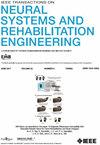沉浸式虚拟现实超市认知评估的集合学习算法。
IF 5.2
2区 医学
Q2 ENGINEERING, BIOMEDICAL
IEEE Transactions on Neural Systems and Rehabilitation Engineering
Pub Date : 2024-09-30
DOI:10.1109/TNSRE.2024.3470802
引用次数: 0
摘要
早期筛查轻度认知障碍(MCI)对于延缓认知退化和治疗痴呆症至关重要。传统的神经心理学测试通常用于 MCI 检测,但由于其测试环境过于简单和安静,往往缺乏生态效度。为了弥补这一不足,我们的研究开发了一个沉浸式 VR 超市认知评估程序(IVRSCAP),模拟日常认知活动,以提高 MCI 检测的生态效度。该项目涉及成都市第二人民医院和多个社区的老年参与者,包括 MCI 患者(301 人)和健康老人(1027 人)。他们参与了虚拟现实超市认知测试,产生了包括用户行为数据、测试认知维度游戏数据、轨迹数据和区域数据在内的复杂数据集。为了分析这些数据,我们引入了一种针对不平衡样本的自适应集合学习方法。我们的研究的主要贡献在于证明了该算法在根据 IVRSCAP 中的表现对 MCI 和健康组进行分类方面的卓越性能。对比分析证实,该算法的功效优于传统的不平衡样本处理方法和经典的集合学习投票算法,在召回率、F1-分数、AUC 和 G-mean 等指标上明显优于它们。我们的研究结果主张将 IVRSCAP 和我们的算法结合起来使用,作为一种技术先进、生态有效的方法来加强早期 MCI 检测策略。这与我们将现实模拟与先进计算技术相结合,以提高认知健康评估的诊断准确性和治疗效果的更广泛目标是一致的。本文章由计算机程序翻译,如有差异,请以英文原文为准。
An Ensemble Learning Algorithm for Cognitive Evaluation by an Immersive Virtual Reality Supermarket
Early screening for Mild Cognitive Impairment (MCI) is crucial in delaying cognitive deterioration and treating dementia. Conventional neuropsychological tests, commonly used for MCI detection, often lack ecological validity due to their simplistic and quiet testing environments. To address this gap, our study developed an immersive VR supermarket cognitive assessment program (IVRSCAP), simulating daily cognitive activities to enhance the ecological validity of MCI detection. This program involved elderly participants from Chengdu Second People’s Hospital and various communities, comprising both MCI patients (N=301) and healthy elderly individuals (N=1027). They engaged in the VR supermarket cognitive test, generating complex datasets including User Behavior Data, Tested Cognitive Dimension Game Data, Trajectory Data, and Regional Data. To analyze this data, we introduced an adaptive ensemble learning method for imbalanced samples. Our study’s primary contribution is demonstrating the superior performance of this algorithm in classifying MCI and healthy groups based on their performance in IVRSCAP. Comparative analysis confirmed its efficacy over traditional imbalanced sample processing methods and classic ensemble learning voting algorithms, significantly outperforming in metrics such as recall, F1-score, AUC, and G-mean. Our findings advocate the combined use of IVRSCAP and our algorithm as a technologically advanced, ecologically valid approach for enhancing early MCI detection strategies. This aligns with our broader aim of integrating realistic simulations with advanced computational techniques to improve diagnostic accuracy and treatment efficacy in cognitive health assessments.
求助全文
通过发布文献求助,成功后即可免费获取论文全文。
去求助
来源期刊
CiteScore
8.60
自引率
8.20%
发文量
479
审稿时长
6-12 weeks
期刊介绍:
Rehabilitative and neural aspects of biomedical engineering, including functional electrical stimulation, acoustic dynamics, human performance measurement and analysis, nerve stimulation, electromyography, motor control and stimulation; and hardware and software applications for rehabilitation engineering and assistive devices.

 求助内容:
求助内容: 应助结果提醒方式:
应助结果提醒方式:


